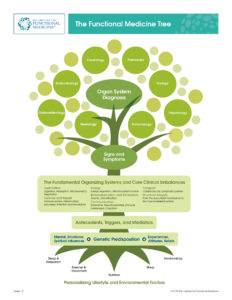
I didn’t set out looking for a Functional Medicine doctor. I wasn’t sure what such doctors do. But that’s where I ended up. I was suffering from “nonspecific, slowly progressive gym funk.” You might be thinking, JUST WASH YOUR GYM CLOTHES! I wish it had been that simple. Rather, my issue was not having enough energy to work out at the gym. Some days I would put in a respectable effort and break a sweat. But on other days, I’d spend more time sitting on the machines than actually using them. Was I just lazy? Not getting enough sleep? Eating too many chips? I wasn’t sure. After routine blood work failed to show a reason for my gym funk, I by chance found a Functional Medicine doctor.
Before I go on, let me share a definition of Functional Medicine from the Institute for Functional Medicine (IFM) Website:
“Functional Medicine addresses the underlying causes of disease, using a systems oriented approach and engaging both patient and practitioner in a therapeutic partnership…By shifting the traditional disease-centered focus of medical practice to a more patient-centered approach, Functional Medicine practitioners spend time with their patients, listening to their histories and looking at the interactions among genetic, environmental, and lifestyle factors that can influence long-term health and complex, chronic disease. In this way, Functional Medicine supports the unique expression of health and vitality for each individual.”
Back to my story….
The Functional Medicine doctor took a detailed history, did a lot of blood testing, and found out I had a methylation defect. This was news to me. There were some other issues that showed up which made sense from my history – i.e., a low vitamin D which may have contributed to a prior unexplained stress fracture, and a few other findings. She prescribed methylfolate, vitamin D, multivitamins, and some other supplements. After about 6 – 8 weeks, I noticed more energy and was able to work out much more consistently.
I can’t say for certain if the methylation defect was the culprit (it’s apparently pretty common), but if I stop the methylfolate, doing so adversely impacts my energy. Whatever the truth is, I was able to see a physician who could spend as much time as need with me, addressed my problem, and provided effective treatment. And she didn’t have to deal with insurance. Sound good?
Hoping this career direction might be an option for some of my war-weary physician clients, I decided to attend the Institute for Functional Medicine’s foundational course – Applying Functional Medicine in Clinical Practice. Even though I was only able to attend the first of five days, I felt I had a good toe-dip into the program.
The first day was packed with presentations, round-table case studies, and time for networking and super delicious, healthy snacks (I’d go back for the food alone). The aim of this course was to provide an in-depth experience of the IFM’s model of assessing and treating patients. Additional training can be taken, leading to a certification in Functional Medicine.
Here is a partial list of topics addressed during the conference:
- Root Causes and Treatment of GI Dysfunction
- Immune Dysfunction and Inflammation
- Food Allergies, Sensitivities, and Intolerances
- Prescribing an Elimination Diet
- ABCD’s of Nutritional Evaluation
- Assessment and Treatment of Adrenal and Thyroid Dysfunction
- Understanding Sex Hormones
- Managing a Woman’s Hormones
- Mitochondria and Energy Dynamics
- Insight, Intuition, and the Therapeutic Partnership
While at the conference, I ran into a friend of mine, Dr. Julie Reardon. Julie is a Family Practice physician who completed a fellowship in Integrative Medicine and has a busy private practice in Austin. We did a post-conference debriefing. She said she has already been using some of the Functional Medicine approaches with her patients, but that the conference was a fantastic learning experience.
“It was like being back in medical school, and drinking from a fire hydrant, but in a good way,” she said. “We delved into a lot of the science and biochemistry (remember the Krebs cycle?). They have excellent tools and resources for us to use in our practice, such as the Functional Medicine Timeline to capture the patient’s medical history in a way that makes it much easier to see connections, correlations and inciting events.”
She was clearly very energized by her experience, summing it up by adding, “My greatest surprise and pleasure out of all it was that the Institute for Functional Medicine embraces uncertainty in practice. They give us the science and tools to work with, but they keep the art of medicine alive by not being so rigid in the approach. They are willing to think outside the box.”
In addition to running into Julie, I had another stroke of luck getting to meet with one of my clients, Dr. Lara Salyer, a family physician from Wisconsin.
We had a chat a few weeks later and she shared some impressions of her experience,
“Initially I thought my career fatigue was due to medicine in general. But in reality, it’s the way our current primary care office visit is structured. As a traditional Family Practice doctor, we aren’t allowed the time or supportive resources to make any substantial impact in mind-body-spirit health as a whole. Learning about Functional Medicine inspired me to reconsider staying in medicine. I am excited to dig deeper into the biochemistry and physiology to help patients live a healthier life, hopefully with less reliance on prescriptions. My favorite part was connecting with other physicians who had already transitioned into their Functional Medicine practices. I understand it takes time and there are challenges, but I am willing to give it a try.”
I asked Lara if she had any advice for other doctors experiencing burnout? She offered these words, “Before you abandon medicine, take a look at this. If you went into medicine because you care about motivating the individual and making real changes socially and humanitarianly, don’t jump ship just yet. Check out Functional Medicine.”
Let’s say you check out Functional Medicine and do the training. What kinds of opportunities exist?
This is where I got a big surprise.
Before I did my research for this blog, I was only familiar with doctors who hung up their own shingle and started a practice from scratch or incorporated Functional Medicine into an existing practice.
Then I stumbled upon this website, Integrated and Functional Connections, where there are actual jobs (I mean real, live, jobs!) for Functional Medicine physicians! Currently, there are postings by the Cleveland Clinic, Baylor Scott and White, and the Sutter Medical Group, to mention a few. Before I could even finish reviewing the jobs, I reached out to Lisa McDonald, founder of Integrated Connections, to learn more. Lisa is truly passionate about her role in connecting her clients with healthcare providers. She is very excited about the significant increase in job opportunities since she started her company 7 years ago. When asked about compensation, Lisa responded, “The salaries have also been increasing, and are now competitive to those a Family Practice or Internal Medicine physician makes in the more traditional positions.”
It was very encouraging to hear that both smaller practices and large healthcare systems are recruiting for Functional Medicine physicians.
Although the specialties Lisa recruits from are predominantly Family Practice and Internal Medicine, physicians from a wide range of specialties have become certified in Functional Medicine.
The most common specialties I noticed on the IFM FIND A PRACTITIONER page are:
Family Medicine, Internal Medicine and (IM subspecialties), Emergency Medicine, Anesthesiology, Neurology, Physical Medicine and Rehab, OB/GYN, and Pediatrics. However, I also saw doctors from these areas as well: Psychiatry, Surgery, Radiology, Dermatology, Radiation Oncology, and Ophthalmology. Some physicians devote their entire practice to Functional Medicine, while others offer the model as a complement to their established practice.
If you are interested in learning more:
IFM offers 2 free online eLearning courses, which provide an overview of Functional Medicine and Functional Nutrition.
You can read here about the IFM certification program. And see a listing of upcoming conferences and courses here.
Functional Medicine uses both traditional and novel approaches to help patients. It may be something you want to consider, or not. The good news is that there are options to explore if you are frustrated by the current practice environment. You get to decide if something could work better for you. At the very least, being able to connect with doctors who are finding their passion again may provide some hope and inspiration for your own journey
Latest Posts
Find what you're looking for:
Popular Categories:
Career Change | Career Enhancement | Job Search | Personal Development
4 Comments
Leave a Comment























If you aren’t interested in using medications for mental health, look into Hardy Nutritionals, their micronutrient complex Daily Essential Nutrients is highly research backed.
As I learned from your blog that there is such great and helpful techniques. I used to use them a little bit but never knew about these types of uses from them so thanks for sharing. And I found Functional Medicine in Tempe that provides better services.
Hi Heather,
Thank you for the post. Functional medicine is for everyone but yes testing compatibility is a must and having the right Doctor is also important. Thank you for the post and reference links.
You are most welcome Melissa! There is quite a range in how physicians are practicing Functional Medicine and the patient needs to be comfortable with the approach as well as the potential costs.